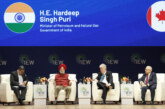
Can Religion Transform Public Diplomacy?
Religion is potent source of peace, righteousness; and virtues. Religion can play positive role in nation-building, ending conflicts between nations, and prove humanitarian assistance for all whose lives are negatively impacted by war, poverty, illiteracy, human rights violations, natural disasters and religious extremism. Religious leaders should guide their followers in right earnest. Religious leaders must exercise their leadership, and engage in partnership with diplomatic initiatives, to bring about a cessation of violence against humanity, to work to confront and end religious extremism in all its forms, the domination of one religion over another and the domination of one nation over another. The religious leaders are resourceful in moulding public opinion on vital social issues. Hence they must be actively involved with stakeholders and decision-makers in the global community. And religious leaders must be seen as equal partners and as positive agents of change in 21st century public diplomacy.
Keeping in view the myriad problems of extremism, terrorism and violence confronting almost all nations, religious leaders of all hues and shades should:
• Condemn those who use religious houses of worship as safe houses for those who are armed and are engaged in armed conflict with others.
• Make use of the commonality of the religious Holy Texts of religious communities to impact change within political and religious systems.
• To affirm and speak out, sustain and support access to religious freedom of expression and practice everywhere in the world.




